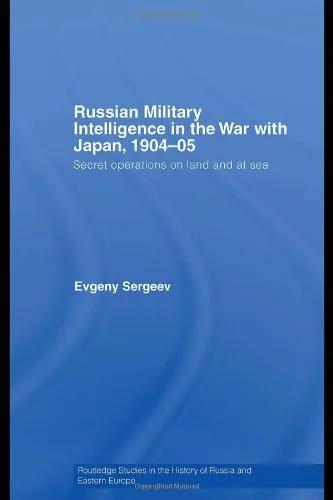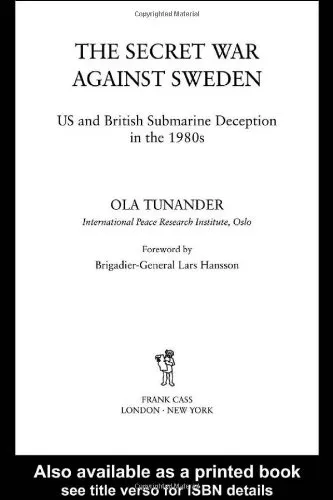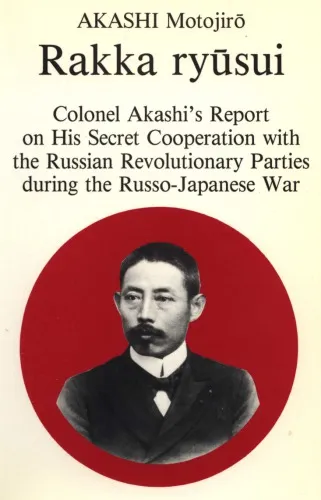Russian Military Intelligence in the War with Japan, 1904–05: Secret Operations on Land and at Sea (Routledge Studies in the History of Russia and Eastern Europe)
4.9
Reviews from our users

You Can Ask your questions from this book's AI after Login
Each download or ask from book AI costs 2 points. To earn more free points, please visit the Points Guide Page and complete some valuable actions.Related Refrences:
Introduction to "Russian Military Intelligence in the War with Japan, 1904–05: Secret Operations on Land and at Sea"
The Russo-Japanese War of 1904-1905 was a pivotal moment in global history, marking the emergence of Japan as a major power and signaling significant shifts within the Russian Empire. In my book, "Russian Military Intelligence in the War with Japan, 1904–05: Secret Operations on Land and at Sea," I delve into the intricate world of military espionage and secret operations that played crucial roles in the conflict's outcome.
Detailed Summary of the Book
As tensions mounted between Russia and Japan at the dawn of the 20th century, intelligence gathering became essential to military strategy. This book explores the organization and operation of the Russian military intelligence services, dissecting how they functioned both on land and at sea during the war. It highlights the complex network of spies, counterintelligence efforts, and the challenges faced by Russian operatives in an increasingly sophisticated world of espionage.
From clandestine meetings to covert data collection, Russian intelligence efforts aimed to pre-empt Japanese strategies and secure a path to victory. Throughout the conflict, these secret operations ranged from the use of codebreakers to intercept communications, to the deployment of undercover agents who gathered vital information on Japanese maneuvers and technologies.
Despite these efforts, the war exposed significant flaws within the Russian intelligence apparatus, including issues of organization, communication breakdowns, and the underestimation of Japanese capabilities. By detailing these challenges, the book provides a comprehensive portrayal of the strategic factors that influenced the war's progression and eventual outcome.
Key Takeaways
- The critical role of military intelligence in modern warfare, particularly in the context of early 20th-century conflicts.
- Insights into the structure and operations of Russia's military intelligence during the Russo-Japanese War.
- An understanding of the geopolitical implications of intelligence successes and failures.
- Lessons on the adaptability of military strategies in the face of evolving technological and tactical paradigms.
Famous Quotes from the Book
“Intelligence in war is not just about knowing the enemy's secrets, but anticipating their moves and remaining a step ahead.”
“The shadows of espionage often reveal the silhouette of truth in the chaos of conflict.”
Why This Book Matters
Understanding the Russo-Japanese War through the lens of military intelligence offers fresh insights into an often-overlooked facet of early 20th-century warfare. The book fills a significant gap in historical literature by highlighting the intricacies and impact of espionage on the global stage. It is a crucial resource for historians, military enthusiasts, and anyone interested in the profound effects of intelligence on the outcomes of conflicts.
Furthermore, by examining the lessons learned by Russian intelligence services, readers gain valuable perspectives on modern security and strategic planning, drawing parallels to contemporary issues in international relations and military operations.
Free Direct Download
You Can Download this book after Login
Accessing books through legal platforms and public libraries not only supports the rights of authors and publishers but also contributes to the sustainability of reading culture. Before downloading, please take a moment to consider these options.
Find this book on other platforms:
WorldCat helps you find books in libraries worldwide.
See ratings, reviews, and discussions on Goodreads.
Find and buy rare or used books on AbeBooks.
1437
بازدید4.9
امتیاز0
نظر98%
رضایتReviews:
4.9
Based on 0 users review
Questions & Answers
Ask questions about this book or help others by answering
No questions yet. Be the first to ask!














